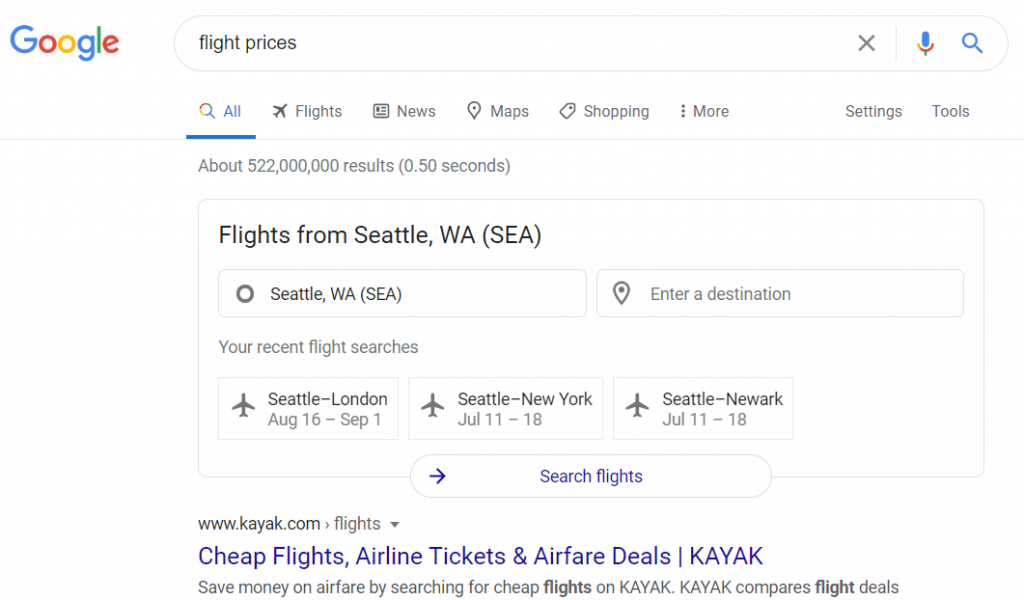For the last few years, I’ve had a tongue-in-cheek phrase on my official bio that reads: “If you feed him great pasta or great whisky, he’ll give you the cheat code to rank #1 on Google.” It’s mostly there because I dislike standard, overly formal, professional bios. But… not infrequently… someone (often a podcast host or the emcee at an event) will ask, “so, Rand, what is the secret to ranking #1 in Google?“
The most direct, and most infuriating answer is easy: be owned by Google.

Google controls the overwhelming majority of web traffic referrals (70%+ come from Google Search, YouTube, & Gmail, not to mention their other holdings). And when Google’s properties rank atop their search results, it not only limits existing competition, but potential competition, too. No SEO-savvy content creator, few entrepreneurs, and even fewer investors want to go head to head against Google dominated spaces. And there’s a lot of them.

Is Google Maps always the best, most relevant, accurate, high quality result for local searches? Definitely not. Does it rank in the top position for 95%+ of local searches (even those that aren’t obviously seeking maps + locations)? Absolutely.

Did Google’s Flight product have to fight its way to the top of the SERPs amidst thousands of flight search competitors? Nope. A month after their acquisition of ITA, Google put its own flight search results atop millions of flight SERPs, and they’ve been evolving its functionality and visibility ever since.

How about Google’s weather results? If you’re anything like me, you frequently find it annoyingly inaccurate and woefully incomplete compared to sources like Wunderground or Accuweather.
But Google Weather doesn’t have to worry about competition. No matter how good any competitor’s results get, they’ll never outrank the product chosen by the search giant themselves.

For years, Yahoo! News, MSN, and dozens of other news aggregators were perceived by many web users to be superior to Google’s own “Google News” product. But that never stopped the now-monopoly power from offering premier SERP placement to only sources willing to jump through the hoops of Google News’ ever-changing requirements. Google News never needs to fear competition. Other news sources might attempt high quality aggregation, but Google’s own product, no matter its accuracy, biases, inclusive or exclusiveness, cannot be dethroned.

On July 12th, 2014, less than half of all video-snippet style results in Google came from YouTube. Any web page with video markup and a high quality, embedded video could appear this way in the search results. But a few days later, Google made a change that made YouTube videos 90%+ of all video results, and it’s been that way ever since.
Maybe YouTube did some magical SEO on July 16th that suddenly made them vastly better than any other video source on the web… But, I doubt it.
More likely, Google’s executives decided that sending valuable search traffic to videos not hosted on their own property was a waste of lucrative, monetizable viewers. Today, if you want to earn video search traffic from Google, YouTube is the only realistic option.

This same phenomenon holds true for query after query. Want to show up on the right sidebar? Better be part of Google’s empire or their editorially-controlled systems for visibility.

Want to have your hotel atop the search results for local places to stay? You’d better be using Google Hotels.

Looking to show up in Google’s visual results? Google Images is the only way (even clicking one of those pictures won’t take you to the site before it drops you into an Image search where more ads can reach you).

Is Google Finance the best possible result for stock searches? Some might argue it is, but even those who do will quickly admit it hasn’t always been so. Competing financial information products never stood a chance, though. No matter how good they were, or how much better they get, Google’s own product has the monopoly-owned lock on stock price search traffic.
Want more?


